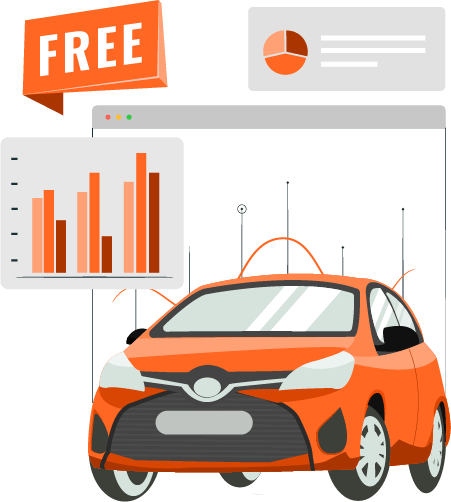The Role of Automotive Data in Pricing Used Cars
Buying or selling a used car can be a daunting task. As a buyer, you want to ensure you’re getting a fair deal, while as a seller, you hope to maximize the value of your vehicle. In both cases, the concept of pricing plays a pivotal role, and in today’s digital age, automotive data has become an indispensable tool in achieving fair and accurate pricing.
Ready to unlock the true value of your vehicle? Get a free market valuation now and make informed decisions. Simply enter the VIN below!

The Complex World of Used Car Pricing
Pricing a used car is far from straightforward. Unlike new cars with fixed manufacturer prices, the value of a used vehicle is influenced by a myriad of variables. These can include the vehicle’s make and model, age, mileage, condition, location, market demand, and various other factors. Traditionally, used car pricing relied heavily on personal judgment, historical market knowledge, and manual comparisons. However, this approach is far from precise and can often lead to disparities in pricing that leave both buyers and sellers dissatisfied.
This is where automotive data analytics steps in, transforming the used car market by providing a data-driven approach to pricing.
Harnessing Automotive Data Analytics for Used Car Pricing
Automotive Data leverages vast amounts of historical and real-time data to assess the value of a used car accurately. Here’s how it works:
- Market Data Analysis: Data analytics tools compile and analyze market data from various sources. This includes pricing information for similar vehicles, recent sales data, and market trends. By comparing your car to others with similar specifications, these tools can estimate its fair market value.
- Vehicle History: Data analytics can access vehicle history reports, providing insights into past accidents, repairs, ownership, and other critical factors affecting the car’s value. This information helps determine a more precise valuation.
- Regional Variations: Local market conditions can significantly impact a used car’s value. Data analytics takes into account regional variations, adjusting prices based on location-specific supply and demand dynamics.
- Demand and Seasonal Trends: Analyzing historical sales data, these tools can identify demand patterns and seasonal fluctuations. For example, prices for convertibles might rise in the summer and fall in the winter.
- Economic Factors: Economic factors such as fuel prices, inflation, and consumer confidence can influence used car pricing. Data analytics considers these variables for a holistic pricing assessment.
- Vehicle Features and Options: Advanced analytics can also assess the impact of specific features, such as navigation systems or leather interiors, on the car’s value.
The Impact on Buyers and Sellers
For buyers, automotive data analytics provides a transparent and reliable method for evaluating whether a used car is priced fairly. This reduces the risk of overpaying and ensures a more informed purchase decision.
Sellers, on the other hand, benefit from data analytics by accurately pricing their vehicles to attract buyers. Competitive pricing increases the likelihood of a quicker sale, which can be particularly advantageous if the seller is looking to upgrade to a newer model.
Automotive Data and Its Crucial Role
Data analytics in the used car market relies heavily on a continuous influx of automotive data. Automotive data encompasses a wide range of information, including vehicle specifications, market trends, historical pricing data, and even macroeconomic factors that impact car values. Without access to this vast pool of data, accurate pricing assessments would be nearly impossible.
Automotive data providers play an essential role in this ecosystem by collecting, aggregating, and distributing this data to various stakeholders, including data analytics companies, dealerships, and consumers. They ensure that the information used for pricing decisions is up-to-date, accurate, and comprehensive.
Conclusion
Automotive Data analytics has revolutionized the used car market by providing a data-driven, objective, and fair method for pricing vehicles. Buyers can make more informed decisions, while sellers can attract potential buyers with competitive pricing. However, the effectiveness of data analytics in pricing used cars heavily depends on the quality and breadth of automotive data. It’s clear that the marriage of data analytics and automotive data has transformed the used car market into a more transparent, efficient, and equitable space for all parties involved.